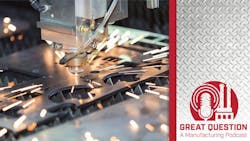Podcast: What do manufacturing technology orders say about the U.S. manufacturing economy?
Chris Chudzik is the principal economist for the Association for Manufacturing Technology (AMT). In his current role, he is responsible for examining trends in the overall economy that affect the demand for manufacturing technology. This includes managing surveys which compile the data necessary to get a full picture of the U.S. manufacturing landscape. Chris recently spoke with Robert Brooks, editor in chief of America Machinist, about manufacturing technology and the correlation between machine tool orders, cutting tool orders, and the U.S. manufacturing economy.
Below is an excerpt from the podcast:
AM: I think a lot of our listeners may not be clear, so please tell us what is AMT, and what is manufacturing technology?
CC: Absolutely. I've been finding out in my presentations recently that, you know, any time you say, “manufacturing technology,” everybody has a totally different picture in their heads. AMT is the Association for Manufacturing Technology. Our members either build or sell metalworking equipment. Every other year, there's the IMTS show at McCormick Place in Chicago, which is coming up this September. We put on that show, and it's a really great showcase of exactly what our members do and the vital role that they play in the manufacturing economy.
AM: OK. So it's cutting tools and grinding tools. It's turning tools, it's metal-forming tools. It's all types of CNC-based machinery that supports downstream manufacturing by OEMs.
CC: Yep, exactly. Everything you would typically picture in a machine shop, and even things beyond that. We have emerging technologies, additive software, all these different technologies that come together to make things.
American Machinist is a center for ideas and insights on technologies for machining, cutting, tooling, forming, manufacturing materials, robotics, quality, and shop operations.
AM: OK. What happens in this sector is important to all of those downstream operations. Could you define manufacturing technology with some easy-to-recognize examples?
CC: Yeah, absolutely. So even though manufacturing technology might not be as forefront as some other particular sectors, it's integral to almost everything that we do or consume. If you imagine an automobile, that's a pretty easy example. There's lots of metal parts in there. You have the engine block. That needs to be cut out. You have the hood, things like that that need to be stamped. Even if you look farther beyond goods, the service sector is pretty heavily reliant on manufacturing technology as well.
Everybody knows you need to make an airplane out of metal parts, but nobody really buys an airplane. You buy the ticket on an airplane. So even though that's a service, it's heavily reliant on manufacturing technology. Even things like a haircut, which you might not think about, the scissors need to be made out of metal. Even the ball bearings that make the chair swivel, they're made on the machines that our members make.
AM: That's a great example. What type of businesses invest in manufacturing technology?
CC: So it's pretty wide-ranging. Probably the largest consumer of manufacturing technology is job shops. They're machine shops that just contract with OEMs, make specific parts, things like that. Beyond that, it's generally large manufacturers such as aerospace, automotive. Basically anybody who wants to make a part out of metal would be a customer of manufacturing.
AM: OK, let's get closer to the point. What do manufacturing technology orders indicate about the manufacturing economy.
CC: So it's a really good leading indicator of where capacity needs are going to be. For example, certain automotive manufacturers may need to anticipate that demand is going to be down in a couple months. So they need to adjust their production lines. Not only to manufacture the volume of cars that consumers are going to demand, but also the exact types that consumers are going to demand. So taking a look at where that investment is happening is a really good indicator of where corporations think that either consumer demand or B2B demand is going to be in the near future.
About the Podcast
Great Question: A Manufacturing Podcast offers news and information for the people who make, store and move things and those who manage and maintain the facilities where that work gets done. Manufacturers from chemical producers to automakers to machine shops can listen for critical insights into the technologies, economic conditions and best practices that can influence how to best run facilities to reach operational excellence.
Listen to another episode and subscribe on your favorite podcast app
About the Author
Robert Brooks
Robert Brooks has been a business-to-business reporter, writer, editor, and columnist for more than 20 years, specializing in the primary metal and basic manufacturing industries. His work has covered a wide range of topics, including process technology, resource development, material selection, product design, workforce development, and industrial market strategies, among others. Currently, he specializes in subjects related to metal component and product design, development, and manufacturing — including castings, forgings, machined parts, and fabrications.
Brooks is a graduate of Kenyon College (B.A. English, Political Science) and Emory University (M.A. English.)
